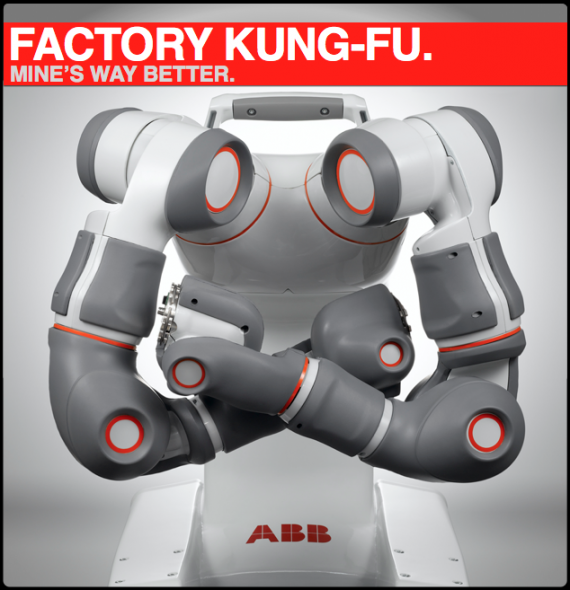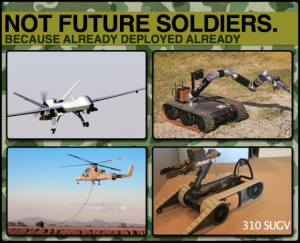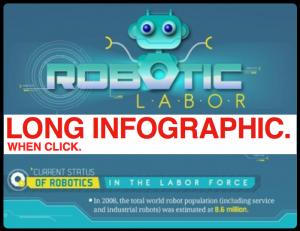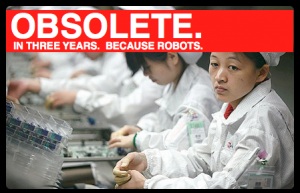Okay, Here’s the Thing:
Came across this brief but interesting piece about China’s pending labor crisis over at the Washington Post, and I’m going to swing back around to the robot up above (VIDEO) in a moment, but first, dig on this:
Economics, Yo.
With various technologies, humans have built vast networks of trade and currency and opportunity. For better or worse or neutral, as a globally connected species we’ve decided a capitalist economic system is what works best. I’m not saying there was a vote or conscious choice per se, what I mean is that capitalism is what we’re all doing, and things for the human animal are better than they’ve ever been, and no one’s proposed anything better (OWS, at best you’re a poo-flinging baboon).
Now, economic systems are essentially governments, and there are many theories on and examples of their practical application. Here in realityland, the practice of market capitalism seems to be the most universally feasible, generally beneficial, and least horrifically exploitative. And if you don’t like that, well, consider that at times we have indeed embraced hardline socialism, communism, fascism, theocracy, monarchy, feudalism, etc., and those experiences all suck(ed) pretty hard (nihilism & anarchy don’t get a voice here because they’re dumber than dumb). Like democracy or the iPhone, M-Cap expresses an ideal, some do it better than others and it’s far from perfect, but for now it’s the best we’ve got. Okay, so…
Made in China by Humans. For Now.
AS SUCH, the world wants/needs stuff – we need product – this is the system’s lifeblood. As consumers, to get stuff we exchange something of value ($/¥/€, etc.), and that something is in turn exchanged, and so on.
As this exchange system has progressed and globalized/modernized over the past several decades, China has in ways become the world’s factory – our stuff comes from there – they make SO MUCH of it, and they do it on the cheap and easy. So of course China then gets loads and loads of $/¥/€, etc., and with a literally global consumer base, Chinese manufacturing has become essential and inseparable from the economic circuit. An absolute prerequisite for this system has been China’s vast, cheap, malleable, and easily replaceable wage slaves. Oops I mean labor force.
But then technology happens. And… uh-oh.
See, the highly attractive price/performance of robotic manufacturing is approaching a tipping point where it becomes both feasible and preferable (see: Foxconn). While a large initial investment, the robots will quickly pay for themselves (and won’t complain, get hurt, commit suicide, take breaks, and all that other stuff soft and sensitive mammals do).
Then – what about the factory owners? As they’re stabbing forward with fiery Chinese capitalism, will they realize that they’re going to severely and fundamentally impact their own economy and disrupt the earning cycle for millions when they replace all those workers? I think they’ll probably charge ahead full-blast and not even touch the brakes. Reasons being on one hand, consumers aren’t going to stop consuming, and on the other, potential profits from a primarily robotic workforce will be irresistible. A huge swath of the human labor force, aside from robot tech support, could be easily and quickly phased out of the manufacturing sector.
So then the factory labor market dies, already crappy jobs are outsourced to the non-biological, and you’ve got the classic economic force of tax base erosion – or a contextually appropriate something like that. Probably tax base collapse. Rapid collapse. Think about the economic impact this had on the American middle class over several decades (e.g., big box stores and the American Consumer), and then imagine what it would do to a developing economy in just a few quarters.
This is where the shortcomings of capitalism come back around for China, and in this case, because robots – robots are to the Chinese economy as China was to the rest of the world’s manufacturing base. But the robotics effect, potentially, could be exponentially faster. For the immediate future, however, even after robot factories ramp up, China will still make a whole lot of the world’s product. Maybe not for long, though.
As my 6 regular readers know, I believe human technology on the whole drives us inexorably toward the betterment of the species, but that process is not without speed bumps. Millions of suddenly unemployed Chinese, made up of both displaced factory workers and those employed in the industries built around supporting them (approximately 40% of GDP), would be a rather ferocious bump. And on top of that…
Designed in California – China’s Other Big Technology Problem
Related and in addition to lost labor jobs and resultantly eroded tax base, the other side of the blade is that the stuff China’s making is based on instructions given by the rest of the world. No one lines up for the latest homegrown Chinese-designed products, we clamor for that which China can make for us per our specs (Engadget’s KIRF section is full of things China makes that no one wants). The other huge economies of the world function primarily on consuming products almost invariably made in China, but designed domestically.
Point here is that, the United States, for example, could also buy those robotic factory workers that Foxconn’s getting, cut Foxconn out, and then save big on shipping and handling. Because the cheap labor is all we really want from China. What makes an iPhone an iPhone comes from California, namsayen?
Is China Hosed?
It breaks down like this right here:
Punch #1: the move to robotic labor;
Punch #2: China has limited product-related intellectual capital;
Kick to the Junk: The developed world gets their own manufacture-bots.
And… China’s economy goes a big floppy one.
So apply the robotics invasion potential to other sectors of the Chinese economy, and there we’ve certainly got the recipe for a Bubble Economy, and bubbles always break – ask Japan (and Krugman). And Japan, don’t fret too hard – you might get that #2 spot back sooner than you think.
Of course this is all speculative, and I hate to put out a piece with so many “maybes” and “could very wells” and “possiblys” and “looks likes,” but the evidence here is pretty strong that China should pay serious attention, because it looks like robots are coming to get you, man.
[ARTICLE – WASHINGTON POST]
[ARTICLE – NYT]







